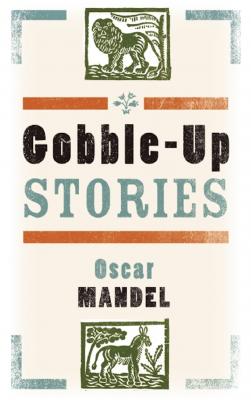ТОП просматриваемых книг сайта:
Gobble-Up Stories. Oscar Mandel
Читать онлайн.Название Gobble-Up Stories
Год выпуска 0
isbn 9781938849220
Автор произведения Oscar Mandel
Жанр Мифы. Легенды. Эпос
Издательство Ingram
GOBBLE-UP STORIES
(in alphabetical order)
The Cock Who Made the Sun Rise
A Conversation Between a Bulldozer and a Mouse
The Farmer, His Son, and His Mule
How God Learned What Measure Is
In the Belly of the Whale
The Innovation
The Journey of a Cow
La Fontaine’s Apology
Landscape With Cloud and Dunes
The Lucky Pebble
The Lunatic Pigeon
The Moth Who Disguised Himself as a Dragon
The Nameless Tree
The Parliament of Animals
The Perfidious Spider
The Pony Who Came to a Stream
The Queen and the Poodle
The Rich Ibis and the Pauper Thrush
The Rock and the Sea
The Sociable Swallow
The Sparrow and the Executive
The Spinster, the Canary, and the Cat
The Squirrel Who Was Caught in a War
The Stork Who Praised Long Necks
The Stubborn Cobbler
The Termite and the Ant
The Three Revolting Animals
The Tiger Who Became Humane
The Trojan Horse
Two Blind Men
The Two Mice
The Two Mosquitoes
The Tycoon and the Architect
Venice Entertains the King of Podolia
Appendix: Gobble-Up Stories 1966–2014
Once upon a time I found a letter in my mailbox from a friend upbraiding me for offering him advice which he thought unethical. I had suggested that he mail the manuscript of a hopeless novel to two publishers at the same time. In his letter he invoked the moral majesties of Moses, Socrates, Spinoza, and Kant. He and they were right, my advice had been naughty (if wise), but the heaviness of the artillery deployed against my insignificant target amazed me. Out of this amazement, and the blameworthy amusement that followed, grew, I don’t know why—yet with the rapidity of a mushroom after the rain—the fable “How God Learned What Measure Is.” I could, I suppose, explain that having been brought up in Belgium speaking French, I inevitably knew and loved my La Fontaine. But La Fontaine in particular, and fables in general, were far from my conscious mind on the day, indeed in the year, my friend’s letter arrived. Hence I must fall back on that convenient darkness, the subconscious mind, a mental tunnel where I see nothing, though a well-lit fable emerges at the exit.
Even more mysteriously, once I had composed my little apologue, a troop of others came running as if at a signal—as if they had been lying in wait for years in that darkness. I remember this, decades later, as one of the stranger circumstances of my life. For a few months the stories lined up, so to speak, urging my pencil to materialize them. A dozen stragglers came later; in afteryears a few others; a pair fairly recently. Thus the collection grew from thirty-three (the original Gobble-Up Stories) to forty-six fables.
This augmented edition, published here for the first time in English, also brings to light the sometimes deep revisions I made on many if not most of the original thirty-three. Indeed, revision has been the one task my diminished imagination has always been up to. I continued and have never ceased to revisit most of these texts, and, like a fond parent who cannot let his children go, I have kept trying to comb out their imperfections and to brush up their attractions.
Why “Gobble-Up”? The word can be taken as alluding to the pleasure (the presumed pleasure) of “consuming” these fables, but I meant it more, at the time I thought it up, as an eat-or-be-eaten reference to the cruel world with which, alas, so many fables must cope.
Three of these gladly admit to a clear pedigree. One is my variant of the famous tale of the Crow and the Fox—Le Corbeau et le Renard—the one every child and adult in the French-speaking world knows by heart. “The Cock Who Made the Sun Rise” goes back to Edmond Rostand’s Chantecler (his extravagant comedy of roosters), though Rostand had it from Aesop or Phaedrus, I don’t know which. And the source of “In the Belly of the Whale” is an obscure political pamphlet by August von Kotzebue, which I read while writing a book on that singular contemporary of Goethe. If there are predecessors for some of the other fables, I have forgotten what they are. Be that as it may, even the three stories I have named are original in the ordinary sense of that word. They are not “creative imitations” of their models, but new fables inspired by and rooted in old ones.
Plato tells us that Socrates was about to versify Aesop before

